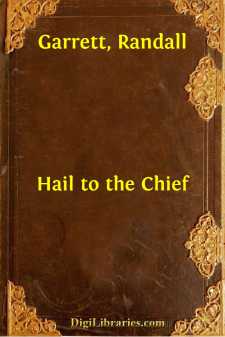Categories
- Antiques & Collectibles 13
- Architecture 36
- Art 48
- Bibles 22
- Biography & Autobiography 813
- Body, Mind & Spirit 142
- Business & Economics 28
- Children's Books 15
- Children's Fiction 12
- Computers 4
- Cooking 94
- Crafts & Hobbies 4
- Drama 346
- Education 46
- Family & Relationships 57
- Fiction 11828
- Games 19
- Gardening 17
- Health & Fitness 34
- History 1377
- House & Home 1
- Humor 147
- Juvenile Fiction 1873
- Juvenile Nonfiction 202
- Language Arts & Disciplines 88
- Law 16
- Literary Collections 686
- Literary Criticism 179
- Mathematics 13
- Medical 41
- Music 40
- Nature 179
- Non-Classifiable 1768
- Performing Arts 7
- Periodicals 1453
- Philosophy 64
- Photography 2
- Poetry 896
- Political Science 203
- Psychology 42
- Reference 154
- Religion 513
- Science 126
- Self-Help 84
- Social Science 81
- Sports & Recreation 34
- Study Aids 3
- Technology & Engineering 59
- Transportation 23
- Travel 463
- True Crime 29
Supermind
by: Randall Garrett
Categories:
Description:
Excerpt
In 1914, it was enemy aliens.
In 1930, it was Wobblies.
In 1957, it was fellow travelers.
In 1971, it was insane telepaths.
And, in 1973:
"We don't know what the hell it is," said Andrew J. Burris, Director of the FBI. He threw his hands in the air and looked baffled and confused.
Kenneth J. Malone tried to appear sympathetic. "What what is?" he asked.
Burris frowned and drummed his fingers on his big desk. "Malone," he said, "make sense. And don't stutter."
"Stutter?" Malone said. "You said you didn't know what it was. What the hell it was. And I wanted to know what it was."
"That's just it," Burris said. "I don't know."
Malone sighed and repressed an impulse to scream. "Now wait a minute,
Chief—" he started.
Burris frowned again. "Don't call me Chief," he said.
Malone nodded. "Okay," he said. "But if you don't know what it is, you must have some idea of what you don't know. I mean, is it larger than a breadbox? Does it perform helpful tasks? Is it self-employed?"
"Malone," Burris sighed, "you ought to be on television."
"But—"
"Let me explain," Burris said. His voice was calmer now, and he spoke as if he were enunciating nothing but the most obvious and eternal truths. "The country," he said, "is going to hell in a handbasket."
Malone nodded again. "Well, after all, Chief—"
"Don't call me Chief," Burris said wearily.
"Anything you say," Malone agreed peacefully. He eyed the Director of the FBI warily. "After all, it isn't anything new," he went on. "The country's always been going to hell in a handbasket, one way or another. Look at Rome."
"Rome?" Burris said.
"Sure," Malone said. "Rome was always going to hell in a handbasket, and finally it—" He paused. "Finally it did, I guess," he said.
"Exactly," Burris said. "And so are we. Finally." He passed a hand over his forehead and stared past Malone at a spot on the wall. Malone turned and looked at the spot, but saw nothing of interest. "Malone," Burris said, and the FBI agent whirled around again.
"Yes, Ch—Yes?" he said.
"This time," Burris said, "it isn't the same old story at all. This time it's different."
"Different?" Malone said.
Burris nodded. "Look at it this way," he said. His eyes returned to the agent. "Suppose you're a congressman," he went on, "and you find evidence of inefficiency in the government."
"All right," Malone said agreeably. He had the feeling that if he waited around a little while everything would make sense, and he was willing to wait. After all, he wasn't on assignment at the moment, and there was nothing pressing waiting for him. He was even between romances.
If he waited long enough, he told himself, Andrew J. Burris might say something worth hearing. He looked attentive and eager. He considered leaning over the desk a little, to look even more eager, but decided against it; Burris might think he looked threatening. There was no telling.
"You're a congressman," Burris said, "and the government is inefficient. You find evidence of it. What do you do?"
Malone blinked and thought for a second....














